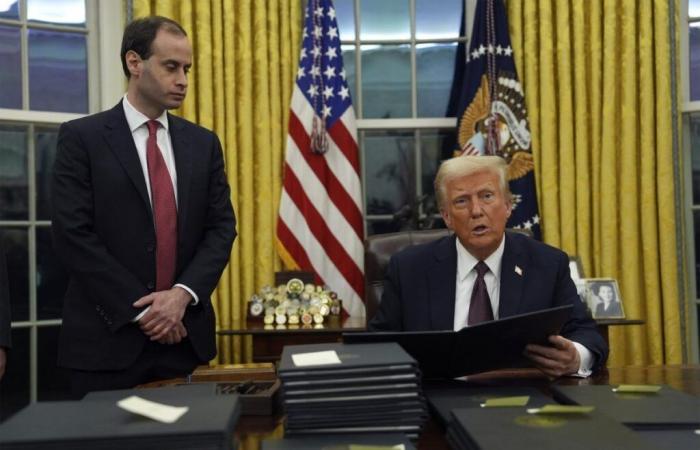OTTAWA — If U.S. President Donald Trump’s threat to impose tariffs on Canada is alarming enough, other measures he announced Monday after his inauguration could have their own implications for Canada.
Here are five directives from Donald Trump that could affect Canadians:
Pressure to remove Facebook tax
Canada implemented a digital services tax in June that applies to revenue from online services, such as advertising on social media platforms. Big tech companies have said it hurts their businesses, while companies that promote trade with the United States say it is an irritant to Washington.
The legislation authorizing the digital services tax came after Canada spent years participating in an effort by the Organization for Economic Co-operation and Development (OECD) to implement a global tax on multinational corporations. Some lobbyists have pushed Canada to wait for the OECD to come up with a global standard instead of pushing for its own tax.
Donald Trump signed an executive order targeting the OECD’s proposed global tax and triggering investigations into any country with tax rules that “disproportionately affect American businesses.” According to Michael Geist, a law professor at the University of Ottawa and an e-commerce specialist, Canada’s digital services tax is “an obvious target.”
Refugee Resettlement
In addition to measures to strengthen the border, Mr. Trump is suspending refugee resettlement in the United States until an unspecified date.
The move could increase pressure on Canada to welcome more people seeking safety, at a time when Ottawa is trying to limit the number of people resettling in the country due to housing shortages.
Refugee advocates say it could undermine ongoing efforts to resettle people from Afghanistan in the United States.
Energy policy
Donald Trump is withdrawing the United States from the 2012 Paris Agreement on climate change — a major international treaty intended to guide efforts to avoid catastrophic global warming — as well as the 1992 United Nations framework on climate change .
The 47th president also signed an executive order calling for an expansive approach to energy exploration, “including on the Outer Continental Shelf.” Another order provides for the exploitation of liquefied natural gas (LNG) in areas of Alaska where the Joe Biden administration had limited drilling. This could impact the global market, just as Canada plans to increase its LNG exports.
Mr. Trump’s orders also end some U.S. programs intended to boost the use of electric vehicles. These programs have heavily influenced Ottawa’s spending on industrial plants intended to secure Canadian jobs in the electric vehicle sector.
University of Guelph economics professor Ross McKitrick mentioned in a post on
-Donald Trump is considering ending tax credits to reduce the cost of electric vehicles in the United States, and if he does so, Canada’s investment in electric vehicle battery factories will decline significantly. Canada has included production subsidies for factories, such as Volkswagen and Stellantis, to match U.S. tax credits, but the contracts stipulate that these subsidies are conditional on maintaining U.S. tax credits.
Washington is also seeking to become the “world’s leading producer and processor of non-combustible minerals, including rare earths,” which could put the United States in competition with Canada.
Innovation, Science and Industry Minister François-Philippe Champagne said Tuesday he would prefer to see this as a point of collaboration, adding that Canada has already taken steps to address state concerns. United States regarding China in critical minerals supply chains.
“We have a lot of good things to put on the table,” he maintained.
A hesitant multilateralism
Donald Trump temporarily freezes foreign aid. That could put more pressure on countries like Canada to step up their efforts in a world grappling with numerous wars and the largest number of displaced people in history.
It also removes the United States from the World Health Organization (WHO), which is currently responsible for steering global responses to diseases such as avian flu that could be spread by birds flying across the continent.
Mr. Trump also rolled back sanctions against violent Israeli occupiers in the West Bank and ordered a review of all State Department operations “consistent with an America First foreign policy, which places America and its interests first.
Security clearances
The Republican signed a memorandum allowing his White House adviser to grant interim six-month security clearances — including access to the highest levels of government information — to some aides whose background checks federal authorities are on hold.
Donald Trump delayed signing a deal with Mr. Biden’s outgoing administration last year that would have allowed the FBI to begin processing these clearances more quickly. The president’s order requires that they have immediate access to federal assets, technology and information.
The order applies to assistants and not cabinet appointees. Intelligence experts have expressed concerns about some of Mr. Trump’s cabinet choices — such as his proposed director of national intelligence, Tulsi Gabbard, who has downplayed the actions of hostile states, such as Russia and the former Assad regime in Syria.
Artur Wilczynski, a former senior Canadian intelligence official, noted that Donald Trump’s order opens a point of vulnerability for Canada. He suggested on X that U.S. intelligence partners should “be wary of what they share with the U.S. intelligence community. Mr. Trump has always been, and continues to be, a threat to our national security.”
— With information from the Associated Press






